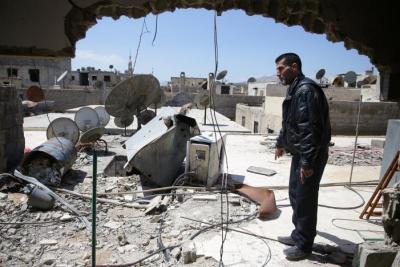3 Questions Regarding Our Bombing of Syria

Reactions to our bombing of Syria, as we joined together with the UK and France, have been intense on all sides.
From the right, President Trump received a barrage of criticism.
In the midst of a profanity-laden, deeply emotional response, Alex Jones of Infowars said, "I just feel like I just had my best girlfriend break up with me."
On Fox News, both Laura Ingraham and Tucker Carlson were critical, with Ingraham asking, "But what do we really accomplish here tonight in Syria? This is not why Donald Trump got elected."
Michael Savage even took a break from dinner to livestream his comments, stating, "My opinion is that this is the greatest disaster of the Trump presidency."
But Rabbi Shmuley Boteach, writing for the Jerusalem Post, took strong exception to Trump's critics.
He stated that, "Obama and his national security trio of John Kerry, Susan Rice and Samantha Power regularly obfuscated on clear-cut moral issues, like whether or not Iran should be penalized for genocidal incitement against Israel, whether Hamas should be punished for terrorism, and most importantly, whether the United States should attack Syrian President Bashar Assad for gassing Arab children. In the case of all three, the Obama quartet decided not to take sides. They would be neutral on Iran, mildly critical of Hamas and take no action against Syrian, even after Obama declared that the use of poison gas against civilians was a red line which he would enforce."
But that was then. "Now, we have witnessed President Donald Trump attack Syria for the second time in about a year because the Butcher of Damascus is using outlawed chemical weapons to exterminate his people. Assad is a vile man, and if the words 'Never Again' are to have meaning, then the civilized world must destroy his capacity for gassing children or lose moral credibility."
What are we to make of this? Why are some Trump supporters outraged with the president's actions? Why are others coming to his defense?
Callers to my radio show were equally divided in their opinion about the bombing, but we only had time to take a small sampling. In contrast, responses to my polls on Facebook and Twitter were in strong support of the president's actions.
I asked, "If you voted for Trump, are you pleased or upset over our bombing of Syria?" On Facebook, as of this writing, votes were running at 78 percent (pleased) to 22 percent (upset). On Twitter, where I could post a third option, votes were running at 48 percent (pleased), 23 percent (upset), and 29% (neutral).
At this point, I have more questions than answers, given the complexity of the Syrian crisis, given the players involved (including Russia and Iran), and given our poor, recent track record in terms of long-term Middle Eastern strategy. Allow me, then, to put my questions on the table.
1) Is our bombing part of a larger plan? Do we have a strategy in place?
It's possible that our bombing had one specific intent: to tell Syria there is a line you cannot cross, and that line is the use of chemical weapons. Whether Russia was directly behind the alleged chemical onslaught or not, the message we sent is clear.
At the same time, it's not unreasonable to ask: What's the larger strategy? How does this comport with getting our troops out of Syria? And do we have a long-term plan regarding removing Bashar Assad?
One of my friends met with leaders in the George W. Bush administration before we took down Saddam Hussein. He asked them how they planned to protect the Iraqi Christians once Saddam was removed. Their non-reply said it all. They looked at him with wide, empty eyes. They had not considered his question. Tragically, we know what happened next.
So, what's the story here? What's our long-term strategy, and how does the bombing fit in with that?
2) Are we 100 percent sure that Assad did use chemical weapons against his own people?
It's one thing for Russia to deny this. It's another thing for a conservative Christian website in England to cite the Organisation for the Prevention of Chemical Weapons (OPCW) in questioning the attack.
According to the UK's Christian Voice, the OPCW "gave Barzah a comprehensive all-clear only last month. Allied aircraft also targeted the Jamrayah (or 'Jamraya' or 'Dummar') site west of Damascus. The facility was also cleared by OPCW."
The Christian Voice goes as far as claiming that, "The UK, US and France bombed the Barzah research site near Damascus in Syria knowing full well it had no chemical weapons."
I certainly hope this is not true, but it's only fair to ask: Did we get this right? Are we sure?
3) Why draw the line with chemical weapons?
This is more of a general question, but I have often wondered about this. Why do we allow certain acts of war to take place, including dropping bombs and launching missiles and firing endless rounds of ammunition, but we don't allow the use of chemical or biological weapons? Why the great outrage over horrific act (namely, gassing your own people) compared to the lesser outrage over another horrific act (namely, dropping bombs on your own people)?
To be clear, I am not minimizing the horror of chemical warfare. I'm only asking: Why react to this specific horror while not reacting to hundreds of other horrors? There are estimates of 400,000 Syrians killed so far in the war. (Some estimates are even higher.) Why our selective reaction?
Again, this is a question that goes beyond the war in Syria, but it is certainly quite relevant today.
So, these are some of the questions on my mind. If you've got some solid answers, I'd love to hear them.




























